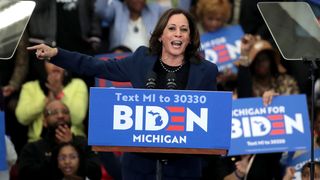In the final debate of the Democratic presidential primary, Joe Biden declared he would pick a woman to run for vice-president on his ticket, saying "there are a number of women in this country who are qualified to be president tomorrow". Functionally, that is the sole attribute a vice-president needs to possess - the ability to take over from an incapacitated president and run the country.
Joe Biden, 77, and Bernie Sanders, 78, stood six feet apart on that stage and engaged in the least controversial snubbed debate handshake in history. The undeniable subtext was COVID-19. Two of the elder statesmen of American politics were forced to grapple publicly with their mortality and profess their love for washing their hands. As COVID-19 coloured that debate, it had already erased centuries of presidential campaigning muscle memory, and now it is saturating every big decision being made in the United States.
In the final debate of the Democratic presidential primary, Joe Biden declared he would pick a woman to run for vice-president on his ticket, saying "there are a number of women in this country who are qualified to be president tomorrow".
The coronavirus will determine the way Joe Biden's campaign is run, and by necessity, it will affect his decision as to which name should be etched alongside his on the ticket.
So, of the most talked-about women at the top of the shortlist, how could COVID-19 factor into their candidacy?
Massachusetts senator Elizabeth Warren drove her stake in the ground this week, first when she endorsed Joe Biden and then when she unblinkingly and simply replied "yes" when asked by a journalist if she would serve as his vice-president. A Warren nod makes some sense during the massive economic reckoning orchestrated by the coronavirus which requires, in the short term at least, the sort of restructuring of wealth in the United States that Elizabeth Warren advocated during the primary campaign. She's the best debater in the shortlist of picks, and could be hyper-effective when paired off against Vice-President Pence in any presumptive Zoom debates.
Her presence on the ticket could also help to bridge the generational and ideological divide in the party somewhat. Young voters will be hit the hardest economically by COVID-19, and having an advocate like Warren next to Biden would smooth over some fears about the sincerity of his more progressive policies.
Young voters will be hit the hardest economically by COVID-19, and having an advocate like Warren next to Biden would smooth over some fears about the sincerity of his more progressive policies.
But with 65 having become the dreaded lower threshold for a high COVID-19 risk, and with that functional role of a vice-president in mind - to survive - Warren's very healthy 70 years may still be an issue.
Additionally, Warren and Biden have an historic skeleton in their closet. Joe Biden's support of a 2005 bankruptcy bill infuriated the then-Harvard economics professor Warren to such an extent that she entered politics. But it was politics she entered, after all, and Warren isn't characterised by the same stubbornness as Bernie Sanders.
Another water-under-the-bridge candidate is California senator Kamala Harris. She could be Joe Biden's political prosecutor in chief. She practically eviscerated him in the July debate over his historic positions on race. The Biden campaign must be asking itself: if Harris could do that to Joe on race, what could she do to President Trump on his response to COVID-19? Moreover, Joe Biden is positioning himself as the healing president, and it would be a sign of healing his own wounds and putting personal affronts behind him if he were to pick Kamala Harris.
Biden comfortably won the broad black vote in the primary, so having a woman of colour by his side may not help him too much more with older black voters - especially now that the Obamas have been deployed. But it could help with younger black voters and minorities.
There's also Stacey Abrams, the narrowly defeated black contender for governor of the staunchly conservative state of Georgia. Since her loss, she has founded the immensely successful electoral reform organisation "Fair Fight". As COVID-19 strangles the operation of American democracy, access to voting issues will rise to unprecedented importance. Abrams has made herself a national authority in a very short amount of time on this issue. Additionally, every elected office is crucial for Democrats. The fact Abrams doesn't hold such a title is a boon in this regard, but gives her chances a whack on the experience quota. She's young. At 46, Abrams' political story may just be beginning.
Warren, Harris and Abrams are all picks that would attempt to broaden the Democratic base, rather than winning over disaffected Republicans. On that front, there are two candidates standing out.
First there's Minnesota senator Amy Klobuchar. A dark horse in the Democratic primary, she peaked too late to challenge the nomination, but high enough to put her name in consideration for vice-president.
A dark horse in the Democratic primary, Amy Klobuchar peaked too late to challenge the nomination, but high enough to put her name in consideration for vice-president.
Klobuchar brings with her the prospect of doubling down on taking back the crucial midwest.
More recently, Klobuchar's husband was admitted to hospital with COVID-19. While he's now doing well at home, Klobuchar will thus be able to empathise with this American tragedy on a granular level. Yet empathy is not an area in which Joe Biden needs shoring up, having experienced personal tragedy on a scale almost unmatched in American politics. Biden's best campaigning moments have always been when he's at his most raw, grappling intimately with loss and the leadership it demands.
Then there's Michigan governor Gretchen Whitmer. She's a future superstar in the Democratic Party who delivered this year's official State of the Union reply - an honour bestowed on Hillary Clinton's eventual running mate, Tim Kaine, in 2006.
Michigan is not only a crucial battleground in the 2020 Senate and presidential races, but is one of the nation's worst-affected states in the COVID-19 battle. Governors have been prominent in the fight against COVID-19 and have been richly rewarded in opinion polls for their toils.
Having a "doer" by his side will help Biden, who is currently stranded in his living room studio while this monumental national crisis unfolds.
But, crucially, as my United States Studies Centre colleague Bruce Wolpe astutely asks: "Can Whitmer really leave her citizens in their hour of urgent need because of her ambition to be vice-president?"
This gets to one final aspect of the ticket: the choice ultimately remains that of those asked. With a formal police report filed about a strenuously denied sexual assault allegation against Joe Biden, there is a distant world in which the woman his campaign chooses doesn't want to be his vice-president.






